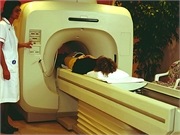For women with breast cancer, coronary artery calcium (CAC) detected on radiotherapy (RT)-planning computed tomography (CT) scan is associated with cardiovascular disease (CVD) risk, according to a study presented at the annual European Breast Cancer Conference.
Roxanne Gal, from the University of Utrecht in the Netherlands, and colleagues examined the association between automated CAC measurement on RT-planning CT scans and the risk for CVD in a cohort of breast cancer patients receiving RT between 2005 and 2016. Data were included from 14,002 patients (mean age, 58 years).
The researchers found that 29 percent of the patients had a CAC score >0. Overall, 8 percent of patients were admitted for CVD and 1 percent died from CVD at a median follow-up of 52 months. The risk for CVD increased with higher CAC after adjustment for age and calendar year at planning CT, from 5 percent for patients without CAC to 28 percent for patients with a CAC score >400. Patients treated with anthracyclines had the strongest association between a high CAC score and CVD (hazard ratioCAC >400 = 5.4).
“In my opinion, treating breast cancer means finding the right balance between maximizing chances of tackling the tumor, while minimizing the risks of side effects, including the risk of cardiovascular disease,” a coauthor said in a statement.
Copyright © 2020 HealthDay. All rights reserved.
Credit: Original article published here.










